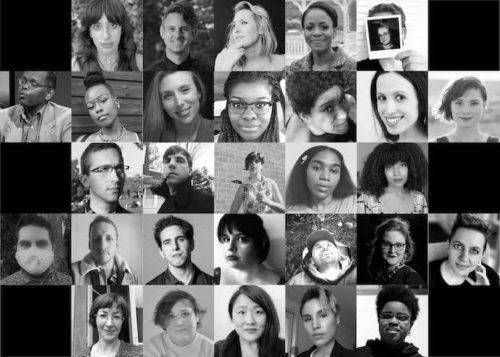ACF Artist Equity Report Card
In September 2020, ACF published a comprehensive Statement of Commitment to Racial Equity that illustrated the organization’s intentions and outlined ACF’s actionable goals embedded within its five-year strategic framework. The statement and its accompanying glossary of terms are a result of an 18-month process of learning, focus groups, and public forums that build on critical race theory and other resources shared in the statement.
Since releasing the statement The ACF Board, staff, and our Equity Committee, a working group comprised of both board and staff positions, have stewarded and monitored the progress towards our goals. We have achieved some successes, learned from failures, and are working to discuss policies and decisions that challenge our assumptions in as public a forum as possible to broaden industry visibility into this critical work.
This is our report card to you, our community, about our first year of this endeavor. We will continue to release these reports on an annual basis and invite you to question, comment on, and keep us accountable to our equity promises.
From the ACF Statement of Commitment to Racial Equity:
ACF’s commitment to being a racially equitable organization guides us and our work. We are committed to centering a diverse and BIPOC* narrative and, as such, have outlined goals for achieving a majority BIPOC – or at 60% – representation throughout the organization by our 50th anniversary in 2025. These goals are reflective of the demographic shift, and trajectory, in our country (resource).
We start here…
ACF honors and acknowledges the Anishinaabe and Dakota people, the ancestral caretakers of this land; we take this time to consider the acts of violence, displacement, and unjust treatment toward them that have occurred over many generations; we offer our respect and gratitude to the elders of the past, to those living today, and to those who will come in the future, for their careful stewardship of this land and its resources and for the rich cultural legacy they will continue to create here.
Bdote

ACF’s home is on unceded land that is extremely significant to the Dakota People.
According to oral tradition, [the confluence] is the place where Dakota people were created or where we came to live on the earth. It’s a confluence of the Minnesota and Mississippi rivers. The Minnesota River is traditionally known as the ‘Mnisota Wakpa’ and the Mississippi River is the ‘Haha Wakpa.’ The first Dakota man and the first Dakota woman emerged out of the earth at that place.
From ensuring more representation in our narrative and storytelling to improving our own nomenclature and the way we talk about our work to offering more ways to engage with ACF and one another, we have been committed to widening the circle by showing the example of who is a part of our ecosystem in the hopes that others will see themselves in that circle.
We see ACF as a space of inclusivity as we move from a membership organization to an artist services and advocacy organization. We seek to be a connector and convener for this vibrant and diverse ecosystem to which we belong. We hope to deepen our relationship with you and provide opportunities for you to deepen your relationship with one another.
Our Philosophy
- “We are engaging in an intervention.” (Douglas Kearney)
- We approach our work with a recognition of existing systems and affecting the change needed while also designing an alternative model.
- We honor people’s self-described identities, including how they identify as an artist and how they identify their music.
- We use the term “anti-racist” to best illustrate our active commitment to learning, listening, and engaging in behavior and actions that eliminate racism.
- Our hope is to make the circle bigger for more people to belong to our community; it is not an either/or but a yes, and…
Our Actions
Supporting and Empowering Artists
- Discontinued ACF’s longstanding Membership Program, making all resources available to all creators
- Launched “Anatomy of a Commission” with partners American Composers Orchestra and National Sawdust to provide more transparency about the commissioning process and encourage informed dialogue from all parties
- Published Criteria for Opportunities Listings; engage in dialogue with opportunity providers about equitable processes
- Board/staff/artist focus group reviewed and changed all of ACF’s funding program requirements and processes (continues)
- Added interview + orientation process for all panelists to ensure biases were considered within the makeup of the awards selection panel; panelists announced in advance of application deadlines
- Launched “Help Desk” to encourage inquiries from artists and their collaborators for resources, guidance, and connections
- Piloted and shifted new model for the innova Recordings record label: curatorial process selecting recording projects in various stages; no administrative fees; free guidance for all artists working on recordings
Modeling Partnerships that Value Composers
- Completed first year of “Composing Inclusion,” a new partnership with Juilliard Preparatory Division and New York Philharmonic, co-commissions 9 Black and Latin-identifying composers to co-create “flex scores” for intergenerational ensembles (powered by Sphinx Venture Fund)
- Launched “Immigration, Identity, and the Arts” series with East Side Freedom Library highlighted musical and literary artists sharing their unique immigrant experience as part of the NEA Big Read project and featuring Thi Bui’s graphic novel, “The Best We Could Do”
- Supported PaviElle French’s residency with young artists and 5 other St. Paul-based arts organizations, titled “Liberation! Lifting Up our Youth“
- Piloted ACF connect partnership with Gabriela Lena Frank Creative Academy of Music; past partners include (AACM)’s Great Black Music Ensemble (Chicago) & Music of the Unsung America (Miami)
Advocacy & Storytelling
- Acquired and now fund I CARE IF YOU LISTEN media hub and 29+ diverse contributors
- Presented thematic series to raise awareness of inequities:
- Out of Context (cultural appropriation)
- Uneven Measures (women’s suffrage/voting rights)
- Casting Light (less visible issues like mental health and wealth disparity)
- Served on panels, advisory councils, and conference planning + contributed to ‘At ACF’ section of ICIYL (Read why executive director Vanessa Rose believes Composers are Key to our progress.)
- Hosted annual Artist Equity Summits and various “study groups,” including in 2022-23 the “Immigration, Identity, and the Arts” series with the East Side Freedom Library as part of the NEA Big Read series
- Engaged in numerous conversations with artists, presenters, leaders, and donors about achieving greater equity for artists, plus advocacy through the Performing Arts Alliance
Internal Changes
- Standing board and staff Equity Committee guides progress towards ACF’s equity goals as part of organization’s overall strategic work
- Engaged in board/staff training with Innocent Technologies, Hillombo Consulting, and other resources
- Initiated transformation of development to “Community-Centric Fundraising” model
- Hired Nonprofit HR support (BIPOC led)
- Revised employee policies to offer more equitable guidelines around issues such as vacation; parental leave; work preferences while also implementing explicit conduct and anti-harassment policies
- Required all employees to take anti-harassment training
- Revamped hiring process and practices, integrating more transparency in description and diverse selection group
- Transferred investments to a firm that prioritizes DEIA
- Transferred operating funds to Woodlands National Bank, owned by the Mille Lacs Band of Ojibwe
- Designed a vendor/consultant selection process to ensure investment and review of equity alignment
Last Updated September 2023
The Numbers
- ACF Staff: 50% identify as BIPOC; 33% women; 16% gender non-binary/gender fluid
- ACF Board (excluding CEO): 47% identify as BIPOC; 37% women
Supporting Artists
- BIPOC-identified applicants: 37% average for all 3 ACF funding programs in FY23 – ACF create, McKnight Composer Fellowships, and McKnight Visiting Composers – plus innova Recordings (does not include average of 25% of individuals who opted out). ** We are updating our forms to reflect a more customized identity selection and describe the reasons we are asking the information. **
We are grateful for the collaborative support of the Jerome Foundation (ACF create), McKnight Foundation, and the Sorel Organization for supporting female-identifying artists on the innova label. - Our new partnership with The Juilliard School’s Preparatory Division and New York Philharmonic, Composing Inclusion, attracted 71 applicants identifying as Black or Latin – 9 were selected through a competitive process, powered by an award from the Sphinx Venture Fund.
I CARE IF YOU LISTEN

Contributor Team
Following ACF’s acquisition of ICIYL in September 2020, an open call for new contributors attracted nearly 200 applications from across the United States and abroad. The 14 exceptional writers chosen from this call have now joined members of ICIYL’s existing team to form a diverse roster of 29 journalists, music creators, performers, multimedia/ interdisciplinary artists, musicologists, historians, podcasters, and arts administrators who contribute to the publication building significantly upon the work of the previous number of staffers.
In FY23, we published 153 articles by 42 contributors, 52% of whom identify as BIPOC; 74% of the 23 playlists were curated by BIPOC artists (all paid for their contributions).
What We Learned
- Organizational culture and systems change slowly; streamlining and benchmarking goals helps us measure progress in the short term
- Rather than moving quickly to check boxes or appear we are making progress, we are intentional about changing systems. It is not a straight line.
- Acknowledging the long-term nature of our work cannot affect our sense of urgency. Systems change requires a critical look at processes as they appear broadly and in the day-to-day.
- Self-awareness is essential.
- Positive change begins with dialogue; dialogue has been and will continue to be the foundation of the Equity Committee.
Areas for Updates/Improvements
- Defining Race – Clarifying the framework, Collecting data
- Broadening “American” – Not assuming the USA as a default or only framework
- Emphasizing dialogue, learning, and storytelling
- Focusing our programming more to support our goals – Deeper rather than broader